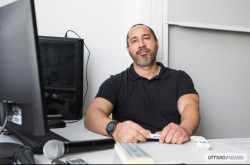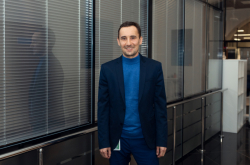Chemist Sara Durini is from Como, Italy, the birthplace of Alessandro Volta, a famous Italian physicist, chemist and pioneer of electricity and power. She explores the properties of the new materials, synthesizes them and discovers what kinds of things they can do; for example: adsorb gases, carry drugs, detect the presence of pollutant molecules, be used for catalysis, as optical sensors, in photovoltaic technologies, and to potentially improve the features of solar cells.
Materials science engineer Rafaella Precker is from the North-East part of Brazil, a city called Campina Grande. It’s much like Leipzig as it is a typical university city. Her work is mostly focused on real-life application of materials. For example, the inorganic materials that the two are working on could be used in cancer therapy for targeted drug delivery and to help avoid some of the side effects common in typical cancer therapy these days.
Their research
Sara and Rafaella work together in the inorganic chemistry group where they work on metal organic frameworks (MOFs), – a fascinating new type of material that is becoming more and more important in recent years. Many scientists are focusing their research on these materials due to the variety of their useful properties.

ITMO's International Laboratory SCAMT
The young scientists found out about ITMO through their supervisor who collaborates with the SCAMT Lab group and who suggested for them to do some research there. One of the benefits of Sara and Rafaella’s stay at the SCAMT lab is that they have access to equipment capable of test the optical or characterization properties of compounds. This kind of analysis is not possible in Leipzig, so their work here adds value and additional results to their research, which they can take back to Leipzig to inform their next steps. The synthetic MOFs that they are working on have certain properties due to their network of nanoscale pores. Rafaella is trying to improve the properties of these synthetic materials for targeted drug delivery.
“When you encase a drug in a material and apply it to the body, there is a burst effect: the drug is delivered quickly, but at the cost of causing side effects to the body; I use MOFs so that the drug is delivered slowly and reaches its precise target area while avoiding the “good” cells.” For example, for cancer patients who are given chemotherapy, they experience side effects in their body, like hair loss and low immunity, but with MOFs the plan is to improve the targeting in order not to affect the other organs and cells, and to go directly to the tumor cells,” – she explains.
Sara is trying to combine the metal ions in the MOFs with ligands to produce a new material with a specific porous size that could help Rafaella’s research; in this regard, her research comes one step before Rafaella’s.
Working abroad
After finishing her PhD in Como, Sara spent about 8 months at the University of Edinburgh.
“It was a very international environment, I was dealing with a new culture and a new way of working,” she explained. As a result, she decided that after her PhD she wanted another experience abroad. “I was fascinated by German culture and the German way of working; they’re really precise,” – shares Sara – “I wrote to our now-supervisor, Professor Hey-Hawkins, that I was interested in her research topic. After that I received a scholarship from the DAAD (German Academic Exchange program), and then a contract from the University of Leipzig when the scholarship ended. I’ve been there for more than a year now.”
Rafafella’s first experience abroad was in 2009, in Germany.
“That’s when I had the opportunity to get to know a new culture. In 2014 I lived in Italy for a few months. My husband was doing his PhD in Leipzig and so I also ended up there and now I have the opportunity to learn about Russia,” – shares Rafaella.

Rafaella Precker and Sara Durini at ITMO University
For Sara, this is her first time travelling outside of the EU, but coming to Russia wasn’t scary. Rafaella says that she has been to Russia before, back in 2014, at a conference in Moscow. People told her that Moscow and St. Petersburg are completely different and that St. Petersburg is much nicer, which she found very true.
Conducting research abroad also has other benefits. As Sara explains, “in every country I’ve been to, you encounter a new way to approach the work you do, and of course there is a positive and a negative side. I think that is important because you get a different point of view on your work; talking to new colleagues about what you’re doing, you are able to check just how knowledgeable about your research you are. Explaining to another person what you’re doing helps you understand how well you understand it yourself.”




